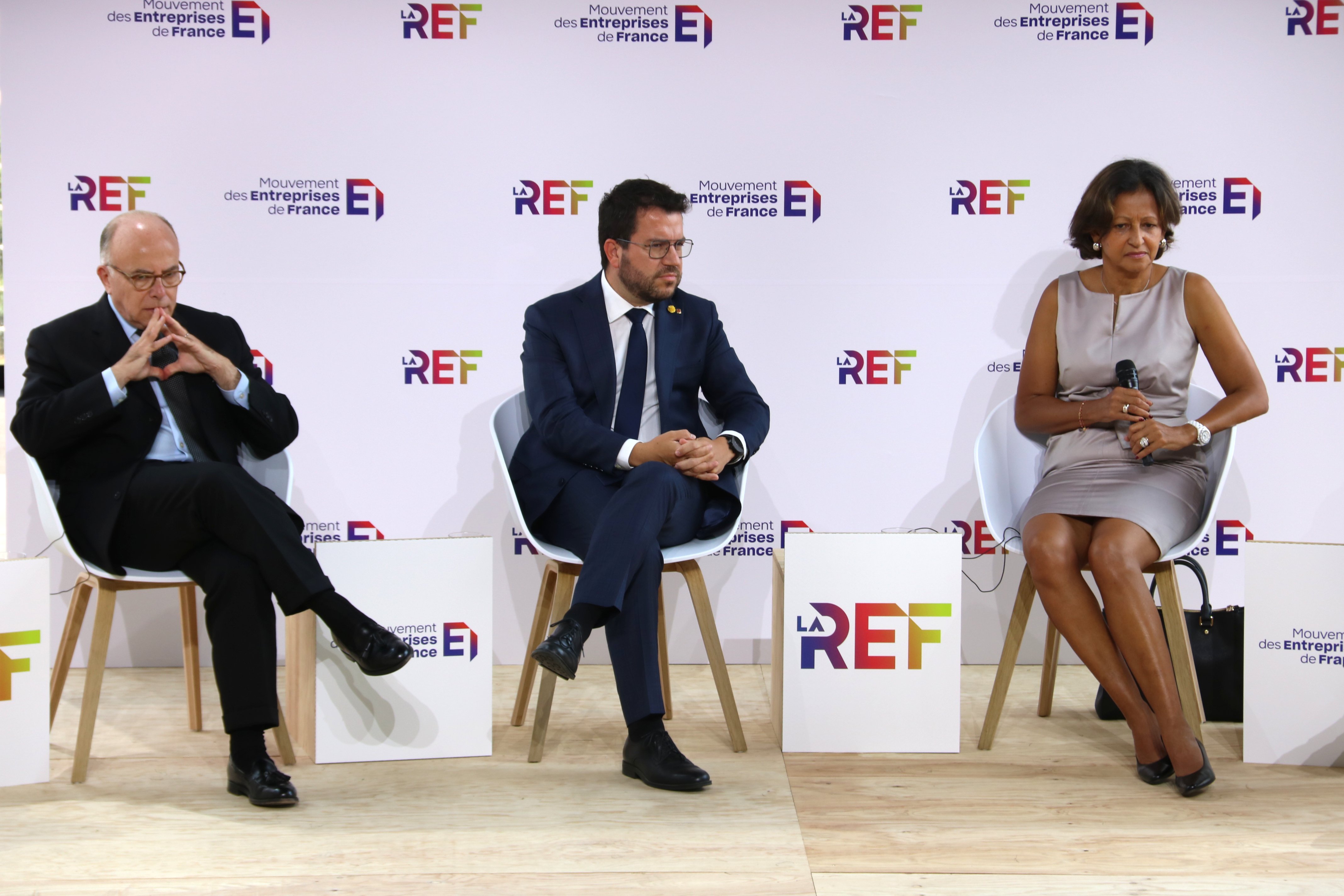"Catalonia is profoundly pro-European. The Catalan independence movement is profoundly pro-European”. This is the message that Catalan president Pere Aragonès wanted to underline with a heavy marker pen this Tuesday in Paris, a difficult setting, where he was taking part in a debate at the most important French business forum. The head of the Catalan executive not only stressed the Europeanism of Catalan society, but also sought to explain the "contribution" that Catalonia could make to the European Union, especially in the energy sphere. It was in this context that he argued for having a direct voice in the issue as a full member of a hypothetical "United States of Europe" after exercising the right of self-determination through negotiation with Spain.
The president of Catalonia took part in the debate "Autonomous or independent, but above all European", organized by MEDEF, the leading French employers' association. He was accompanied by the president of Corsica, Gilles Simeoni, who positions himself close to the thesis of Aragonès, former French prime minister Bernard Cazeneuve and the vice-president of the French territory Guadeloupe, Marie-Luche Penchard. The current French interior minister, Gérald Darmanin, was also supposed to participate, but in the end had to send apologies for his absence.
Pere Aragonès opened the debate by presenting his nation's movement as "Catalan independentist and European federalist", seeking to convey to Europe his message: Catalonia has to be a state with full rights like the rest. "Our project makes sense within the framework of the European Union. We want to be a state in the United States of Europe that many of us dream of", argued the Catalan Republican Left politician. In this respect, he asserted the "contribution" that Catalonia can make today to Europe's challenges, contributing to "autonomy" in the technological and energy fields. "The Catalan people want to have their voice heard directly and the solution is to do this as a member state of the European Union", assured the head of the Generalitat of Catalonia, who also gave a warning that "a response must be given" to the Catalan conflict and it must include a "negotiated and agreed self-determination".
Corsica asks for Catalan-style autonomy
The Catalan president also reviewed the recent past: "In October 2017 there was a referendum on independence that was not agreed with the Spanish state. There was a judicial process that led to the exile of president Puigdemont and the imprisonment of members of the Catalan government". And he reiterated his commitment to dialogue: "We have now resumed a negotiation process between the Catalan government and the government of the state. Our proposal is for the holding of a referendum whose result would be respected by both sides."
Having said all that, however, Aragonès remarked that the answer must be "unique" for Catalonia. Despite "complicity" with Gilles Simeoni, he avoided entering the debate on the response that France must give to the conflict with Corsica, while Simeoni claimed a statute of autonomy like the one Catalonia now has in Spain, an "ability to create its own laws but integrated into the French Republic". However, Jacobin Paris showed its difficulty as a place to speak about independence movements: the only applause during the debate went to former French prime minister Bernard Cazeneuve when, in response to Simeoni, he assured that "for me there is only one people, which is the French people".
Aragonès dodges criticism from Junts
Pere Aragonès had arrived at the independence debate in Paris after a morning in which he had dodged critics within his own pro-independence government on the same issue. After declarations yesterday by coalition partner Junts that the lack of movement towards independence by the Catalan administration had to be urgently corrected, the message that the Catalan president gave his cabinet this Tuesday emphasised "stability": partisan discrepancies were best addressed in the areas of coordination between the two parties, he said, isolating them from the institutions. But while stressing that the executive had to continue working as it had until now, he was also open to "listening to specific proposals" and alternatives "from everyone".

